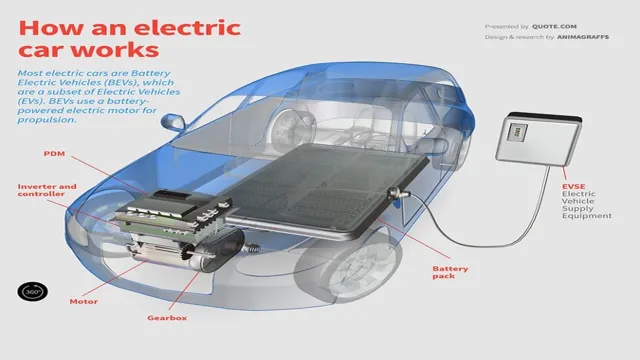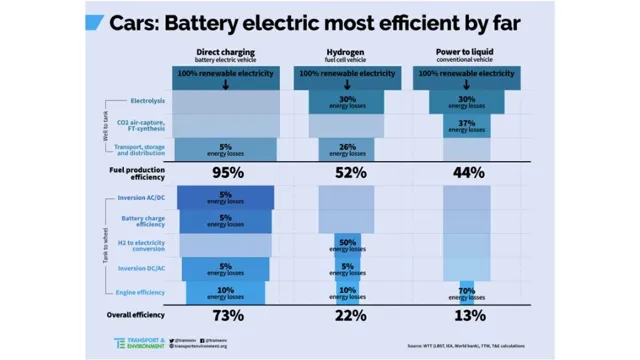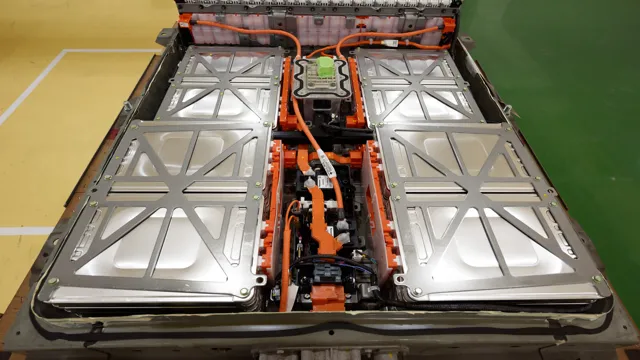The Power of Voltage: Understanding the Intricacies of Electric Car Battery Voltage
Electric vehicles have become increasingly popular these days and are known for their sleek appearance, quiet operation, and eco-friendliness. Along with the increasing demand for electric cars come inquiries on various components of these modern-day wonders, including the electric car battery voltage. In simple terms, battery voltage refers to the amount of electric potential a battery can deliver at its terminals.
The voltage of electric car batteries is a crucial component in determining the range of an electric vehicle, and has a direct effect on its overall performance. Understanding electric car battery voltage is essential for electric vehicle owners and enthusiasts who want to maximize the range and power of their electric vehicles. In this article, we’ll explore what battery voltage is, how it’s measured, how it affects electric car performance, and other fascinating facts about electric car battery voltage that you may find interesting.
Introduction
Electric car batteries have become a popular choice among consumers as they become more environmentally conscious. One of the crucial factors to consider when purchasing an electric car is the battery voltage. The battery voltage can determine the driving range of the vehicle and the power output.
The typical voltage range for electric car batteries is 400-800 volts, which translates to 100-200 kilowatt-hours of energy. Higher voltage batteries can provide a longer driving range and quicker acceleration. However, it is essential to note that higher voltage batteries come at a higher cost.
Despite the higher cost, electric car battery volume remains an essential factor to consider when choosing a vehicle to purchase.
What is Battery Voltage?
Battery voltage refers to the electric potential difference between the positive and negative terminals of a battery. In other words, it is the measure of the strength or intensity of the electrical force within the battery. The voltage of a battery is crucial in determining its overall performance, as it indicates the amount of energy that the battery can deliver to power any device or equipment.
Typically, batteries with higher voltage can supply more power since they contain more energy than batteries with lower voltage. Battery voltage can be measured with a voltmeter, which provides a digital reading on the voltage level of the battery. Understanding battery voltage is crucial, especially if you want to power up your portable devices, such as smartphones, laptops, and cameras, with the right battery.

Importance of Battery Voltage in Electric Cars
Electric cars have become an increasingly popular choice for environmentally conscious drivers. However, one key aspect that many people overlook is the importance of battery voltage. The voltage of an electric car’s battery determines how much power it can deliver to the motor, ultimately affecting the car’s acceleration and range.
Higher battery voltage generally translates to better performance, as it allows for faster acceleration and longer driving distances. On the other hand, lower voltage batteries may struggle to deliver the necessary power, leading to slower acceleration and limited range. It’s important for electric car drivers to understand the significance of battery voltage and consider it when evaluating different models or upgrading their vehicles.
Types of Electric Car Battery Voltage
When it comes to electric car batteries, there are various types of voltage levels available in the market. Generally, electric car batteries come in either 400 or 800 volts, but the actual voltage level will depend on the make and model of the car. For example, the Tesla Model S has an 800-volt battery, while other vehicles may have a lower voltage level.
It’s important to note that higher voltage levels will usually mean a faster charging time and higher performance capabilities. However, these batteries also tend to be more expensive. When selecting an electric car, it’s essential to consider the range and charging capabilities of the battery and ensure it aligns with your specific needs and driving habits.
Lead-Acid Batteries
Lead-Acid Batteries When it comes to electric car batteries, one of the main things to consider is the voltage. There are different types of battery voltage available for electric cars, each with its own advantages and disadvantages. Lead-acid batteries are one of the most common types used in electric cars.
These batteries are known for their reliability and durability and have been in use for over a century. However, they are not the most efficient or high-performing batteries on the market. Lead-acid batteries are heavy and have a low energy density, meaning they require more space and weight to provide the same amount of energy as other types of batteries.
This can limit the range of electric cars that use lead-acid batteries. Despite their limitations, lead-acid batteries remain a popular choice for electric cars due to their affordability and availability. They are also often used in hybrid electric cars, where they can be combined with other types of batteries to provide a more balanced performance.
Overall, the type of battery voltage used in an electric car will depend on a variety of factors, including the vehicle’s design, intended use, and budget.
Nickel-Metal Hydride (NiMH) Batteries
Electric car batteries are an essential component of the efficient functionality of electric vehicles. One of the types of batteries used in electric cars is the Nickel-Metal Hydride (NiMH) battery. NiMH batteries have been in use for over two decades and are commonly used in hybrid and electric cars.
These batteries are capable of providing a high power-to-weight ratio, making them ideal for use in electric cars. NiMH batteries consist of a positive electrode, a negative electrode, and an electrolyte. When the battery is charged, the positive electrode releases nickel ions, and the negative electrode releases hydrogen ions.
During discharge, the nickel ions combine with the hydrogen ions, producing water and electricity. NiMH batteries have a voltage of 2 volts per cell but can be connected in series to produce higher voltage levels.
These batteries are highly durable and have minimal environmental impact, making them a viable option for use in electric cars.
Lithium-Ion (Li-Ion) Batteries
Lithium-ion (Li-ion) batteries are the most common type of electric car battery used today, and they come in a variety of voltage ranges. The voltage of a battery determines how much energy it can store and how much power it can supply to the motor. Electric cars typically use battery packs that are made up of multiple individual cells to achieve the desired voltage.
The most common voltage ranges for electric car batteries are 200-400 volts and 400-800 volts. Higher voltage batteries are generally used in high-performance cars, while lower voltage batteries are used in smaller, more affordable models. One advantage of higher voltage batteries is that they require less current to supply the same amount of power, which reduces the amount of heat generated by the battery and improves overall efficiency.
However, higher voltage batteries also require more sophisticated control systems to manage the increased voltage, which can add complexity and cost to the vehicle. Overall, the choice of battery voltage depends on the specific requirements of the vehicle, including performance, range, and cost.
What Voltage is Suitable for Electric Cars?
If you’re wondering what voltage is suitable for electric cars, the answer is typically around 400 volts. This voltage range provides sufficient power to drive the electric motor and run all other systems, such as air conditioning and lighting. However, the specific voltage required will depend on the size and model of the car.
For example, smaller electric cars may require less voltage, while larger electric SUVs may require more. Nonetheless, modern electric cars are designed with safety features to ensure that the voltage from the battery never poses a danger to people or property. As electric cars become more popular, we are likely to see advances in battery technology that may require less voltage to achieve the same performance, making them even more practical and convenient for everyday use.
Factors Influencing Voltage Selection
When it comes to electric cars, selecting the appropriate voltage can be critical to their performance. Conventional electric vehicles typically use 400V or 800V systems, but there is no fixed rule in this regard. Several factors, such as motor efficiency, range, and charging speed, determine the ideal voltage for an electric car.
For example, some electric vehicles require higher voltage systems to achieve faster acceleration rates or longer ranges. Others may rely on a lower voltage system to simplify their charging infrastructure. In general, selecting the right voltage system for an electric car depends on various factors that must be considered based on the specific needs and requirements of the vehicle.
Ultimately, finding the right balance between performance, efficiency, and practicality is the key to selecting the best voltage system for electric cars.
Recommended Voltage for Electric Cars
Electric vehicles have been an essential topic of discussion and consideration when it comes to reducing the carbon footprint on the environment. The voltage of an electric car battery is significant for determining the range, charging time, and efficiency that an electric vehicle can provide. Generally, electric cars require a voltage of around 400 volts.
This voltage allows the car to provide a range that meets the needs of most drivers while also ensuring charging times are relatively short. However, some electric cars operate with a voltage as low as 200 volts, while advanced high-performance electric vehicles can have a voltage of up to 800 volts. Electric car manufacturers spend a lot of time researching the best voltage for their cars to ensure efficiency, sustainability, and performance.
In conclusion, a suitable voltage for an electric car depends on the car’s make, size, and power requirements. Still, the ideal voltage for most electric cars is around 400 volts.
Conclusion
In conclusion, electric car batteries may have high voltage, but they’re not shockingly dangerous. Instead, they offer a shockingly efficient and environmentally-friendly alternative to traditional gas-guzzling vehicles. So plug in and feel the electric buzz, because the future of transportation is electrifying!”
FAQs
What is the typical voltage range of an electric car battery?
The typical voltage range for an electric car battery is between 200 to 400 volts, depending on the make and model.
Can a higher voltage battery increase the range of an electric car?
Yes, a higher voltage battery can increase the range of an electric car by allowing for greater energy storage capacity and efficiency.
How long does it take to charge an electric car battery to full capacity?
The time it takes to charge an electric car battery to full capacity depends on several factors, including the size of the battery, the charging capacity of the charging station, and the charging speed of the battery. Typically, a standard 240V charging station can fully charge an electric car battery in 4-8 hours.
What is the average lifespan of an electric car battery?
The average lifespan of an electric car battery is around 8-10 years, although it can vary depending on the specific design and usage patterns. Regular maintenance and proper usage can significantly extend the lifespan of an electric car battery.






